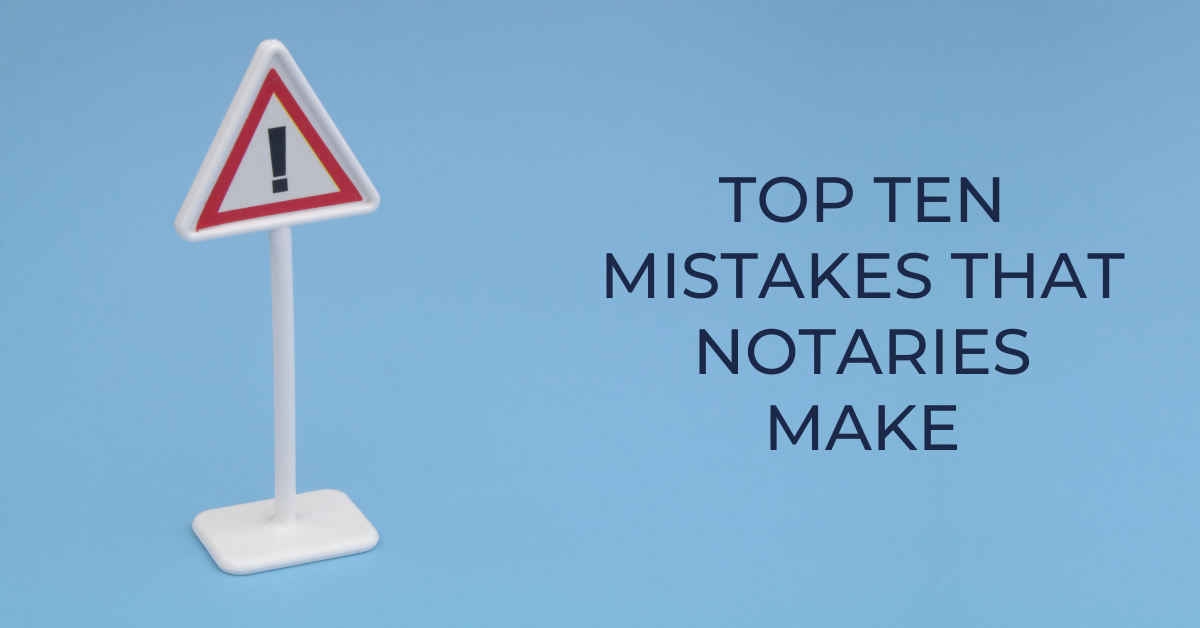Notary Public Underwriters Blog
Top Ten Mistakes That Notaries Make
- Details
- Published: December 30, 2024

Notarizing competently requires knowledge, thoughtfulness, and tireless attention to detail.
The public doesn’t really get this, but that is understandable. After all, the end result of the time, care and thought that good notaries devote to their craft is the completion, signing and sealing of the document’s notarial certificate—and that looks really simple to the untrained eye.
But even the best notaries can commit an error or overlook an important detail. Here is our “top 10” list of notary mistakes and oversights. (Note: these are our “top 10” in terms of troubling mistakes, not frequency.)
1. Failing to require personal appearance of the principal in need of a notarial act.
This requirement is so simple, in concept and in execution, that it should never be violated. Yet notaries will unwisely bend the rules for friends, family, coworkers or because they don’t believe the requirement is truly necessary. Failing to require personal appearance is a profoundly bad offense by a notary, especially since it is such a simple concept to grasp.
2. Failing to perform key steps of notarization (just completing the certificate and stamping).
A signature notarial act requires multiple steps, such as identifying the named signer, assessing the signer’s apparent comprehension and willingness to execute the document, performing the verbal ceremony for the required notarial act, completing the notarial certificate, and creating a record book/journal entry (in states that require it, although ALL notaries should keep a record book/journal as a strongly recommended best practice).
3. Notarizing under an expired commission.
This is another example of a profound failure by a notary, especially since a notary’s official stamp or seal usually contains the commission expiration date.
4. Signing and sealing a certificate for a notarial act not authorized in the notary’s state.
A clear violation of the offending notary’s state law. Notaries may perform only the duties authorized in their state, and must remember that notarial duties can differ from state-to-state. For example, not all states authorize the act of signature witnessing, but the notary could be presented with a document prepared in a state that does authorize that act. The notary would need to explain which signature notarial acts can be performed under the notary’s state law, and let the present signer or a party relying on the notarization choose one.
5. Failing to use state-required notarial certificate language.
Some states’ notary public laws specify use of notarial certificate language that is unique to that state. A notary must know if specific certificate language is required in their state, and amend or replace any notarial certificate that does not comply.
6. Failing to use an official stamp that complies with state law.
While the official format of a notary stamp and/or embossing seal has many similarities from state-to-state, a notary must never assume that “one style fits all.” Each state’s notaries must use only an official stamp or embossing seal that complies with their state’s specific requirements.
7. Failing to note the correct venue (location) of the notarial act.
This error occurs most often when the document preparer prefilled the notarial act venue (for example, “State of Florida, County of Leon”), but a notary located in a different county or state performs the actual notarization. The officiating notary must always check the venue’s accuracy if it has been prefilled, and amend it if necessary.
8. Failing to make a journal entry for each notarial act, when required by state law.
Another profound failure by a notary. Recordkeeping (journaling) requirements are plainly expressed in the laws of states that require this practice. Even notaries in states that don’t require recordkeeping are strongly urged to keep records of all their notarial acts.
9. Failing to notify customers, before notarizing, of fees the notary intends to charge.
No one receiving any service wants to be advised afterward that there will be a fee. If applicable, always disclose your intent to charge a fee before performing the notarial act.
10. Failing to take refresher training on a regular basis.
In defense of notaries, they don’t always realize each time their state laws and rules change. All notaries should make a habit of regularly checking their commissioning officer’s website for any information updates. They should also be alert for helpful notifications from various notary businesses and service providers.
Related Article(s)
How to Complete a Notarial Certificate
Can I Notarize a Document That Is Already Signed?
What to Do When the Notary Certificate Is Missing?
What Should I Do When There's No Room for My Notary Stamp?
Does a Notary Need to See the Entire Document When Notarizing?
Can a Notary Perform a Single Verbal Ceremony for Multiple Notarizations?
Notary FAQs: Essential Answers for Everyday Scenarios
Can a Notary Notarize a Family Member's Signature?
When Can a Notary Use Personal Knowledge to Identify a Signer?
Can a Notary Change a Document’s Date?
Can I Notarize a Document in a Language I Don’t Understand?

